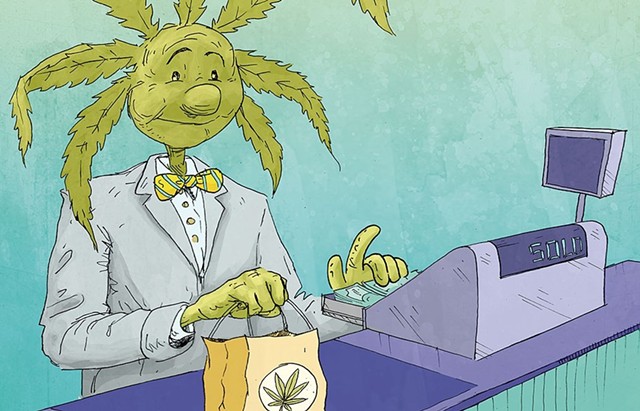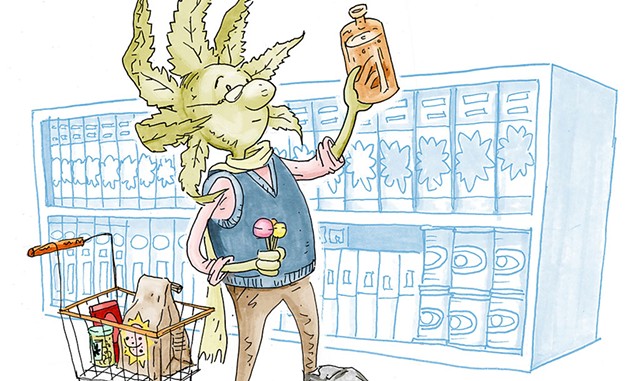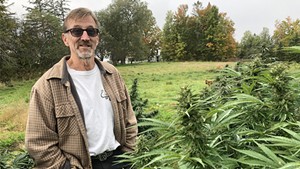Vermont’s Cannabis Control Board estimates that spending on recreational marijuana in Vermont could reach $225 million annually by 2025, which would translate to nearly $46 million in new state taxes.
The figures are just some of the news from
a highly anticipated report the board released last Friday. The 64-page document lays the groundwork for state regulation of a legal market starting next year. The board is proposing rules and fees, subject to legislative approval, for those who will grow, process, test and sell the weed.
The report was filed to several House and Senate committees that may hear testimony in the next several weeks, before the full legislature reconvenes in January, said James Pepper, chair of the Cannabis Control Board.
There’s a reason to hurry: The rules must be in place in time for Vermont’s medical marijuana dispensaries to begin selling recreational pot by the May time frame established in previous legislation. That’s also when small growers, defined as operations with 1,000 square feet or less, could get their licenses and start planting.
“Whatever happens in the legislature, we need them to pass our fee bill pretty quickly,” Pepper said. “They have to deal with it sooner or later if they want us to be on time for that May 1 deadline.”
The report details several proposed tiers for indoor and outdoor growers, with up to 1,000-square-foot plots at the smallest end of the spectrum for both. At the other end, growers could get a “tier six” license: up to 37,500 square feet outdoors and 25,000 square feet indoors.
The state might initially limit growers to the smaller tiers as it figures out the appropriate supply for Vermont’s market. The report says Vermont likely needs 450,000 square feet of combined cannabis “canopy” to sprout enough weed.
The document games out potential yields from grow operations split evenly between indoor and outdoor, as well as a 20 percent outdoor/80 percent indoor scenario. Outdoor operations, Pepper said, are “just too risky” for large growers.
“Plus, there’s always this idea that you can get between four and six harvests indoor over the course of a year, [while] you’re pretty much limited to one harvest outdoor,” he said.
Pepper acknowledged environmental concerns exist about the electricity needed for indoor lighting arrays. "We're trying to do our best to encourage and incentivize outdoor cultivation, but recognizing that there's some just natural limitations," Pepper said.
Outdoor operations are also trickier to secure. The board is still considering various measures it will require for growers. “What is too much, and what really kind of cuts against the natural kind of aesthetic of Vermont?” Pepper said. “If we have, say, 200 small cultivators, do you really want 200 chain-link fences around?”
The board recommends offering two types of retail licenses: nursery, which would allow the holder to sell seeds and plants; and storefront, which is the more traditional cannabis dispensary model, though such shops could also sell seeds and plants.
The board isn’t proposing to limit licenses, though state statute allows only Vermont’s five existing medical marijuana license holders to have a so-called integrated license. Medical dispensaries, which will be allowed to sell in the recreational market, can grow as much weed as they want.
The report leaves open the possibility for future license types that would enable holders to run co-ops for growers, sell pot from established businesses such as general stores, deliver cannabis to customers, and sell for on-site consumption or at events such as concerts.
Geoffrey Pizzutillo, executive director of the Vermont Growers Association, said members of his nonprofit trade org have worked closely with the Cannabis Control Board and are pleased with aspects of the report. But the group wants more of those future license types to be included in the first round “and not kicked down the road,” he said.
"I think that the CCB is moving in a good direction, but it definitely still falls short of equity and accessibility for Vermonters," he said.
By statute, the board must collect enough in license fees to pay its annual budget, which could be as much as $2.8 million next year. But to do so would require exorbitant annual fees that could keep people from participating in the industry, the report says.
Instead, the board proposes smaller fees: $750 each year for an outdoor operation of up to 1,000 square feet, and $1,000 for nurseries. Large-scale growers, though, would have to pay up to $37,500 for the biggest indoor operations.
“Lower fees will invite more applications and licensees, while encouraging participants in the illicit market to join the regulated market,” the board wrote.
The board suggests sliding-scale fees for low-income applicants and has a separate proposal for “social equity reductions.” Qualified applicants — people of color or those who have a cannabis-related conviction, according to Pepper — could have their fees waived in year one and get lessening breaks on fees for the following three years.
"We have sufficient data and reports out there to suggest that Black and Latinx people have been targeted by the war on drugs, both in Vermont and nationally," Pepper said.
While state statute requires that some cannabis sales and excise taxes be used for certain purposes, the board does recommend that the legislature direct 1 percent or 2 percent of tax revenues to the towns where the sales occurred.
"Allowing local governments to generate revenue from local businesses will encourage municipalities to opt in to allowing cannabis retailers, improving access for consumers and, in turn, reducing illicit market activity,” the report says.
There's more work to do: Other reports on the nascent industry are due November 1. They come as the board prepares for a busy month trying to meet various legislative deadlines before the market launches.
"We're really going to ramp up our decision-making very soon," Pepper said.
Read the full report below:





















Comments
Comments are closed.
From 2014-2020, Seven Days allowed readers to comment on all stories posted on our website. While we've appreciated the suggestions and insights, right now Seven Days is prioritizing our core mission — producing high-quality, responsible local journalism — over moderating online debates between readers.
To criticize, correct or praise our reporting, please send us a letter to the editor or send us a tip. We’ll check it out and report the results.
Online comments may return when we have better tech tools for managing them. Thanks for reading.